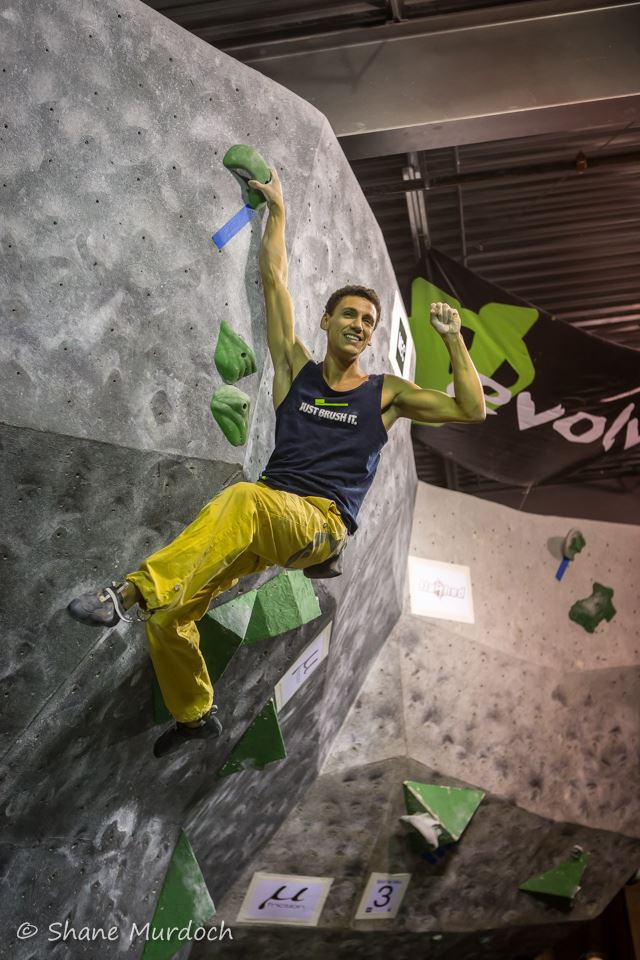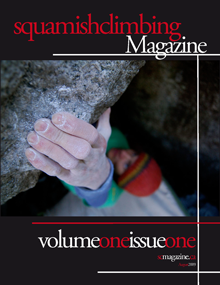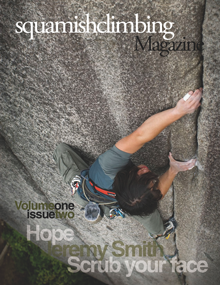This weekend, The Hive North Shore will host their first competition in the new facility. The competition this weekend is part of the Climbing Escalade Canada (CEC) National Series as well as sanctioned by Sport Climbing BC. This means that the competition will host a number of athletes travelling from out of town that will go head to head with our local athletes (who, in our opinion, have been putting on a great show!).
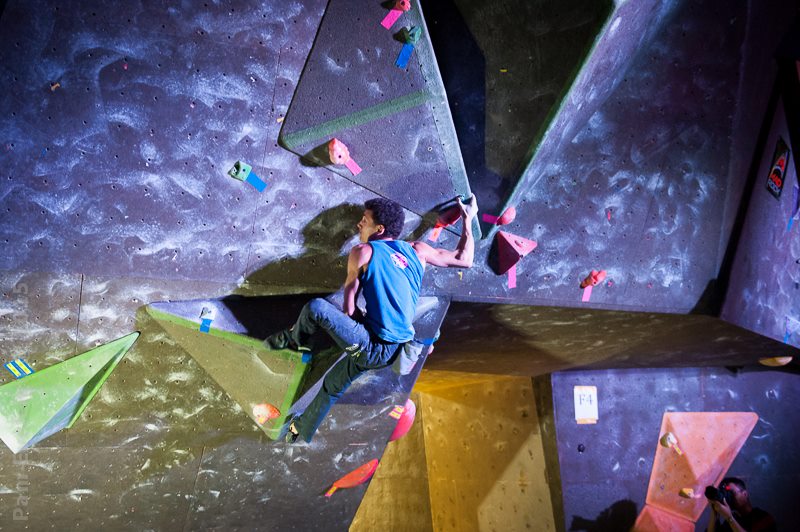
Eric Sethna at The Edge last year. Photo courtesy of Pam Eveleigh ©
One of the athletes coming to town this weekend to compete is Eric Sethna. Eric has started his Canadian competition season in grand style by placing first in the last four Tour De Bloc competitions. No stranger to competition, Eric won his first national championship at the age of ten and took part in four World Cup events this year. Here is what he had to say about this weekend and beyond.
Hi Eric, thanks for taking the time to chat with us. How are things going?
Great! I couldn’t be happier with how my season has gone so far. I’m training hard to keep it up!
It must feel like a busy week for you with the TDB last weekend and then the CEC National series comp this weekend at The Hive North Shore?
For sure, I’ve been competing for 14 years and I’ve never seen such a dense schedule of competitions as this season. Only a month in and I’ve already competed four times. The difficulty is finding enough time to train while traveling to competitions and working full-time. When I compete back to back, I’ll typically only get two hard sessions in on Monday and Wednesday before I start resting for the next competition.
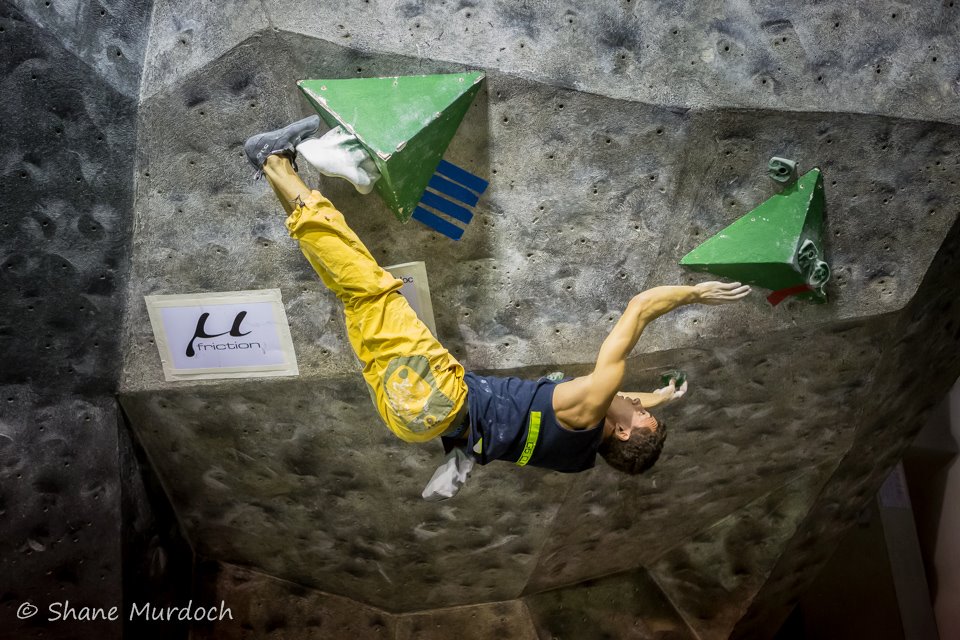
Eric at TDB13 at The Hive. Photo courtesy of Shane Murdoch ©
With four consecutive wins in TDB13 this year, you must be feeling pretty confident going into this weekend?
It’s actually quite the opposite. In my mind, every win adds expectations, and expectations can easily kill performance. Being comfortable and over-confident is the easiest way to underperform. None of the wins I’ve had were easy, and I was only able to do it by squeezing as hard as I could every time. Every competitor at every competition starts with a clean slate, so it’s important to approach every competition in the same way.
Have you changed anything this year in your approach to training that has resulted in such success on the podium?
I have made a number of changes this season to introduce the theme of variety. Firstly, I’m training at three gyms and traveling to every competition possible, so I’m always climbing on new terrain. Secondly, I’ve introduced many new training exercises. One of my favorites is “flash boulders”, where I only give myself one attempt on a new boulder problem. Lastly, I’ve been doing some research into periodization and I’m learning how to phase my long term training plan.
Another contributing factor is that I trained extremely hard throughout the summer to compete at four boulder World Cups and those gains are definitely carrying over to the start of this season.
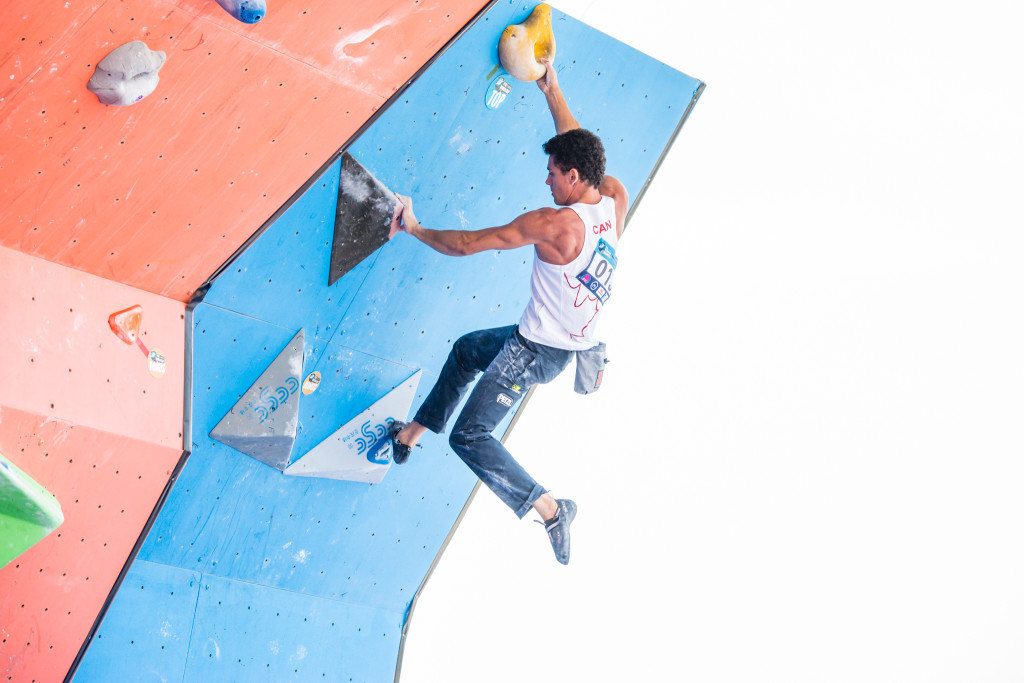
Haiyang World Cup 2015. Photo courtesy of Eddie Fowke ©
What is the benefit of training at three gyms?
Every gym has different angles, holds and setters. Introducing this variety in my training has been an easy way to identify and work on weaknesses.
What was your main training focus prior to the Word Cup season?
I worked hard on building power endurance so I could handle the high intensity of the qualifier rounds. I also spent a lot of time practicing awkward and cryptic movements in preparation for the setting style.
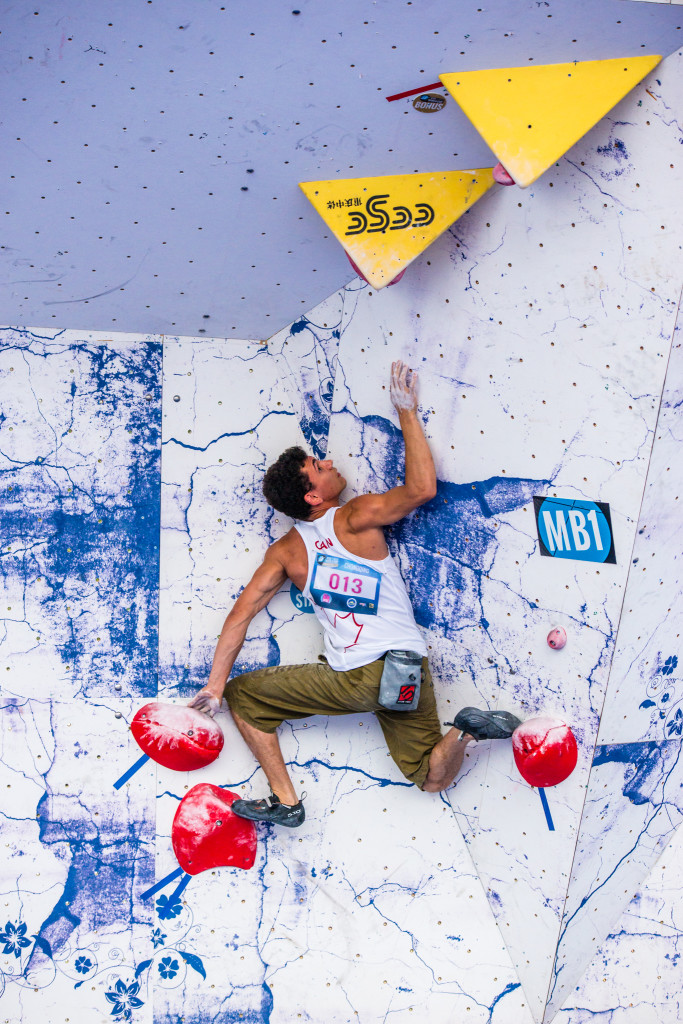
Chongqing World Cup 2015. Photo courtesy of Eddie Fowke ©
For our readers, I want to fill in a few gaps. How old are you, where are you from, and how did you get into climbing?
The basics: I’m 23 years old, currently living in Banff, Alberta, and training at Elevation Place, The Cave and The Banff Centre. I started climbing when I was nine on a portable climbing wall set up for the Banff Mountain Film Festival. I won my first National Championship at age ten and I’ve been hooked on the competition scene ever since.
Do you think being part of a youth team has laid the foundation for where you are now?
I was primarily focused on lead climbing as a youth athlete and attended six Youth World Championships. I was lucky to have trained with Chris Neve and Dung Nguyen who both helped me build a solid base of technique and fitness. Even though I don’t have the endurance that I used to, my current bouldering technique is strongly influenced by my lead climbing roots. On-route problem solving and compulsive chalking are two examples.
We often associate your name with indoor climbing in Canada, but do you also have outdoor climbing goals?
That’s an interesting question because I never considered prioritizing outdoor trips over competitions until recently. Last summer, I spent an incredible few weeks in Magic Wood that made me question whether I want to be spending time and money on training for competitions over enjoying real rock. The short answer is that I plan on doing national level competitions for the foreseeable future. However, my summers may take me to outdoor destinations, such as the Rocklands, Albarracin, Fontainebleau and the Grampians.
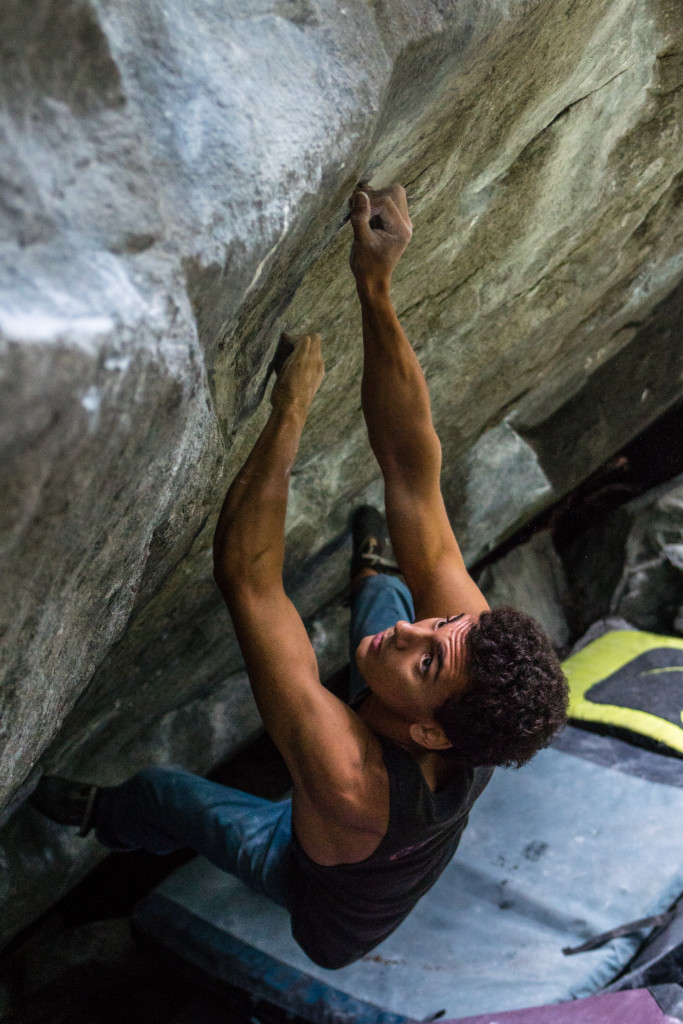
Down Under (v10) in Magic Woods. Photo courtesy of Eddie Fowke ©
What was it about Magic Wood that got you psyched?
The rock is world class. The gymnastic style suited me well and I was able to put down some hard lines very quickly. On my best day, I racked up 88 V-Points. I also got a taste of the carefree climber’s lifestyle. The most stressful decision I had to make was what photo to post on Instagram.
When do you usually get the chance to take advantage of outdoor climbing?
My outdoor trips have typically been planned around international competitions. I hope to get to some new destinations soon. I’ve booked a trip to Las Vegas on New Year’s and I plan to visit Squamish regularly in 2016. Weather permitting, I try to incorporate local outdoor bouldering into my training plan to add variety.
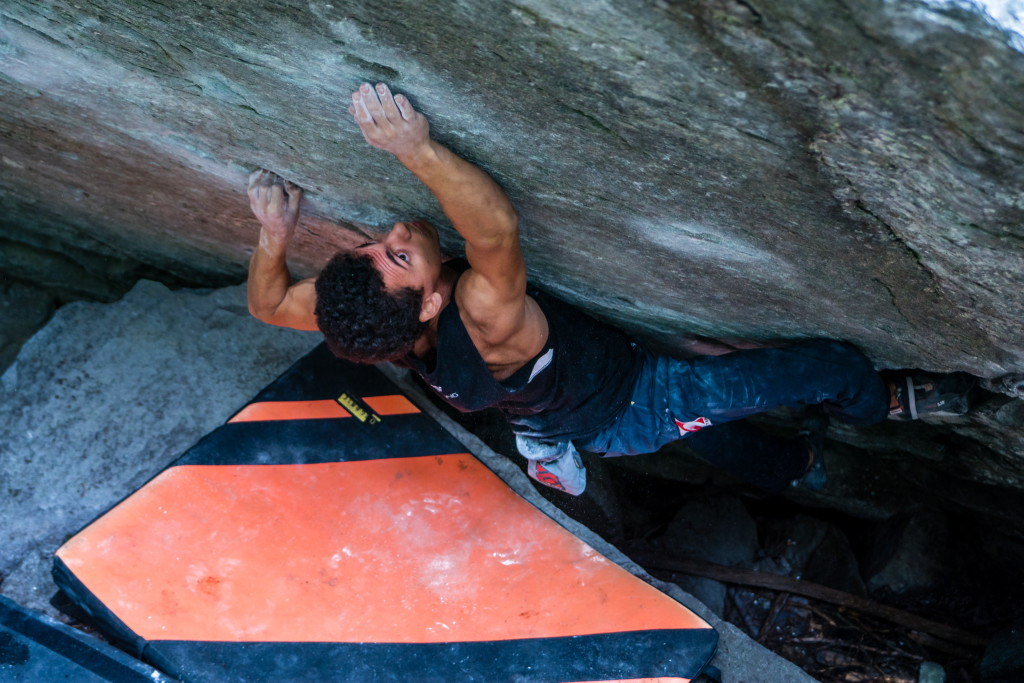
Sofa Surfer (v11) in Magic Woods. Photo courtesy of Eddie Fowke ©
You were a part of the World Cup circuit this year. How was that experience and what did you learn?
I competed at four World Cups last summer: Toronto, Chongqing, Qingdao and Munich. I found that the final standings were influenced by movement and beta, much more than by strength. I finished the circuit with a desire to make these subtle improvements in my climbing. In training, I’ve put a heavy emphasis on movement, stability, weaknesses and previewing.
Coming back from that experience must have been a bit humbling. How did you build yourself back up for competitions in Canada?
Emotionally, I was riding high. I didn’t expect to win any of the World Cups. I went into them with the expectation to get crushed and grow as a competitor, and that’s exactly what happened.
Physically, the transition was mostly seamless. I had about two months between the Munich World Cup and the first Tour de Bloc of the season. I spent a few weeks on the beaches in Italy and then ramped up my training. The quick transition between seasons meant that I had to build rest weeks into my training plan to avoid burning out or getting injured.
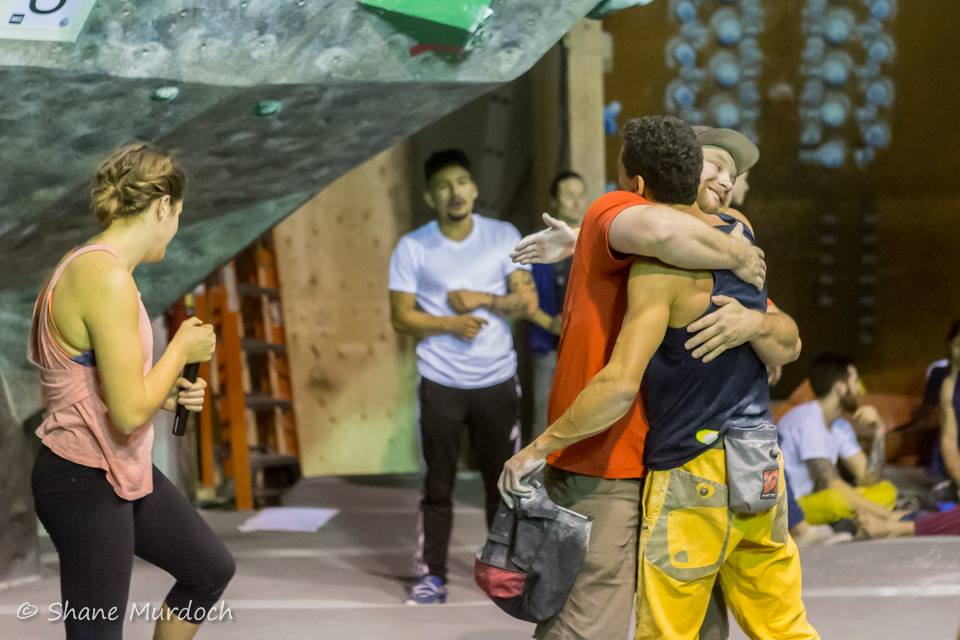
Eric after win at TDB13 at The Hive. Photo courtesy of Shane Murdoch ©
What was it like travelling to Europe and China? Did you get a chance to climb outside?
I never travelled in China before so it was difficult to deal with the logistical concerns like visas, water, language and internet. I only saw two cities, so if I go back this year I’d like to get on some real rock.
I’m quite experienced with traveling in Europe since I go every year for competitions. After Magic Wood, my sister and I scoped out some deep water solo lines in Sardinia while beach lounging.
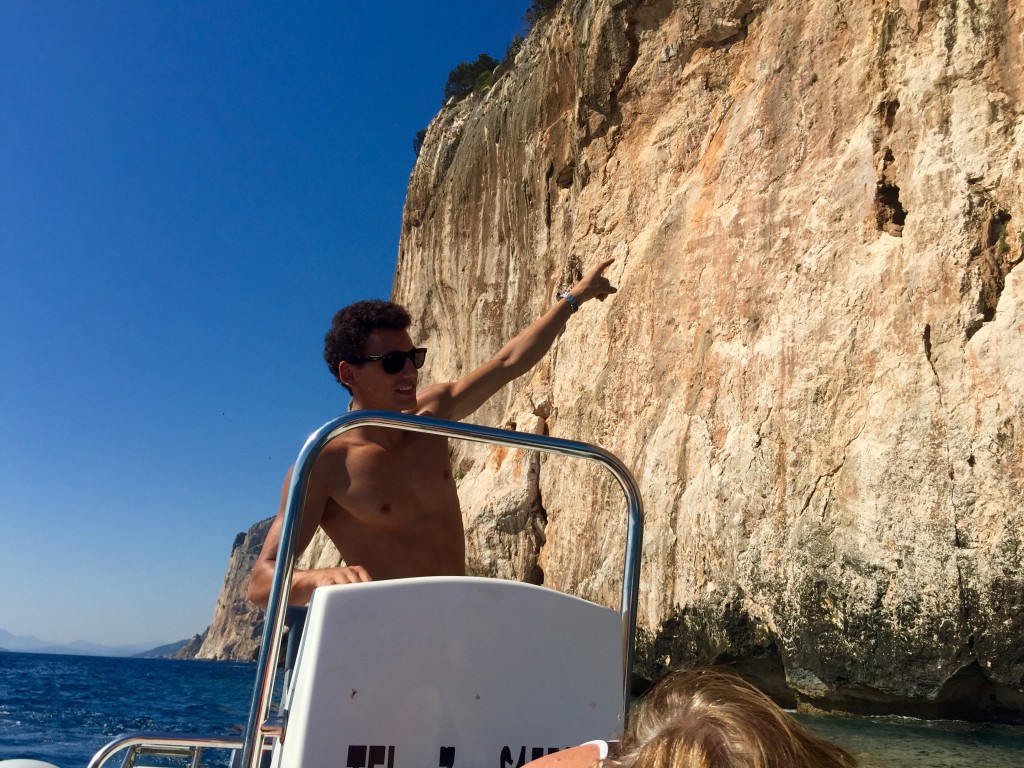
Scoping new lines in Sardinia. Photo courtesy of Eric Sethna ©
Do you and your sister climb and train together a lot?
It’s difficult now that we live at opposite ends of the country. Regardless, she is my favorite climbing partner and always will be.
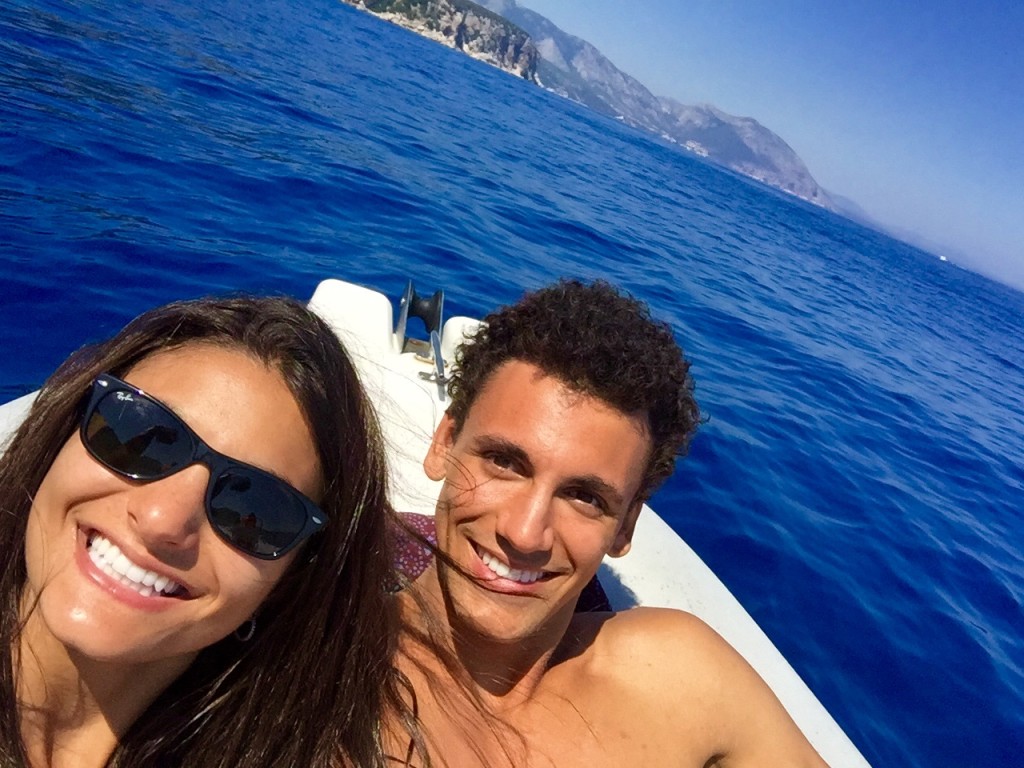
Eric and his sister, Elise. Photo courtesy of Eric Sethna ©
Do you get any financial support from the companies you work with to travel to these comps or does it come out of your own expense?
Money is not a priority for me because I’ve saved a lot and I enjoy spending on climbing. That said, I’m always open to working with more companies to promote great products. I’m currently working remotely as a project manager for a Silicon Valley start-up called SpinPunch. I always travel with my laptop because my job gives me freedom to work from anywhere.
It seems as though competition climbing is on the rise. What do you attribute the change to?
Humans are built to climb, it’s only natural.
What’s next after this weekend?
Next week I’m flying to Montreal to attend a World Cup training camp organized by Tonde Katiyo from Allez Up Climbing Gym. I’m psyched to work on some euro-style technical boulders with some of the best climbers in the world. I’ll spend Christmas with my family and then hit training hard in the New Year in preparation for Nationals at The Hive North Shore in February.
Thanks Eric! Best of luck this weekend and for the rest of the season here in Canada.
Eric is sponsored by Five Ten, Petzl, and G6 Climbing. You can keep up with Eric on instagram here.
Special thanks to Eddie Fowke for the World Cupand Magic Wood photos. Eddie is the editor of The Circuit Magazine and supports his coverage of the World Cup through his publication. Please check out his site.
For information on this weekend’s competion, please visit The Hive North Shore website and be sure to join us on Saturday, Dec. 5th, 2015 for finals. Doors open for spectators at 630pm pacific.
